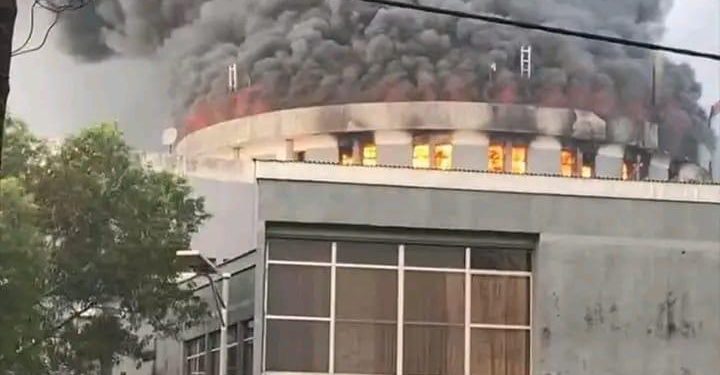By Mackie M. Jalloh
Monrovia, the capital city of Liberia, was thrown into chaos following a violent protest organized by opposition supporters that quickly escalated into destruction. In a shocking turn of events, the nation’s iconic Capitol Building—home to Liberia’s Parliament—was set ablaze by unidentified individuals, leaving significant portions of the structure in ruins.
The unrest began with a protest by the opposition community, which spiraled into violence. The Liberia National Police managed to bring the situation under control temporarily, but tensions remained high. Later that night, unknown perpetrators launched an attack on the Capitol Building, setting it on fire. Despite swift intervention by firefighters, large sections of the building, considered one of the finest government infrastructures in West Africa, were irreparably damaged.
The Capitol Building, a symbol of Liberia’s democracy and national pride, has long stood as a representation of the country’s progress. Its destruction has sent shockwaves throughout Liberia and the West African region. Built to host the legislative arm of government, the edifice was renowned for its architectural beauty and historical significance.
Reports indicate that vital parts of the building, including offices, chambers, and critical archives, were lost in the fire. The full extent of the damage is yet to be assessed, but initial estimates suggest that the rebuilding process could take years and require substantial funding.
Authorities have launched a comprehensive investigation to determine the cause of the fire and identify those responsible for the act. Liberia’s Minister of Justice has pledged to hold the perpetrators accountable, emphasizing the need to safeguard national institutions.
“The burning of the Capitol Building is not just an attack on infrastructure; it is an attack on the very essence of our democracy,” the minister said. “We will leave no stone unturned in identifying and bringing the culprits to justice.”
This incident comes against the backdrop of rising political tensions in Liberia as the country navigates its current socio-political landscape. The opposition protest that preceded the fire highlighted growing dissatisfaction with the government’s handling of economic and social issues. Protesters had taken to the streets demanding reforms, accusing the government of corruption and neglecting the needs of the people.
The protest turned violent when demonstrators clashed with police, leading to injuries and arrests. While authorities managed to quell the initial unrest, the attack on the Capitol Building appears to be a separate and premeditated act. Observers have noted that the escalating tensions between the government and opposition factions could further destabilize the country if not addressed swiftly.
The destruction of the Capitol Building has sparked outrage among Liberians and concern from neighboring countries. Many citizens have taken to social media to condemn the act, calling for unity and dialogue to prevent further violence.
“This is not the Liberia we want to see,” said one Monrovia resident. “Burning down our Parliament will not solve the issues we face. We need constructive dialogue, not destruction.”
Regional leaders and organizations, including ECOWAS, have expressed their concerns about the situation in Liberia. In a statement, ECOWAS called for calm and urged the government and opposition to engage in peaceful negotiations to address the root causes of the unrest.
The attack on the Capitol Building underscores the fragility of Liberia’s democratic institutions and highlights the urgent need for political and social reforms. As the government begins the arduous process of investigating the incident and rebuilding the damaged structure, it must also work to rebuild trust among its citizens.
For many Liberians, the destruction of the Capitol Building is a stark reminder of the country’s turbulent history and the need to safeguard its hard-won peace. With tensions running high, all eyes are on the government and opposition leaders to see if they can rise above their differences and chart a path toward unity and stability.
The burning of Liberia’s Capitol Building is more than just an attack on a structure; it is a call to action for the nation’s leaders and citizens alike. As investigations continue and the ashes settle, Liberia must confront its divisions and work collectively to prevent further unrest. Only through dialogue, accountability, and reform can the country move forward and ensure that such a tragedy does not repeat itself.










